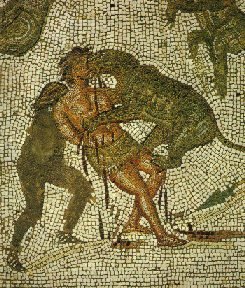In Roman times the death penalty
was sometimes aggravated by the damnatio ad bestias: i.e. being mauled to death by ferocious beasts in the amphitheatre. The condemned person was generally tied to a pole and exposed to ferocious animals that had been kept fastening so as to be more aggressive. A further aggravation consisted in using small beasts, which made for a longer torture.

In Petronius’ novel Satyricon, Echion, a rag-dealer, talks about the next gladiatorial show, in which this slave/treasurer (today we would call him an accountant) was going to be eaten by the beasts:
“We are going to have an excellent munus in three days’ time: they are not professional gladiators, but freed slaves. Our Titus knows how to accomplish things, he always finds something new. This or that, it will be a grand show; I know him, he is not the kind of guy who would make do with anything but the best. There will be the best swords, surrender is forbidden, and the butchery takes place in the middle, so that the whole amphitheatre can see. And (Titus) can afford it, his father died and left him thirty million sestertia; if he spends four hundred thousand he won’t even realise it, and he will be forever remembered. He has already provided for good wrestlers, a woman charioteer and the treasurer of Glyco, who was caught while he amused his lady. We will see the public divided between the ones supporting the morals and the ones who would forgive the lovers. That worthless Glyco gave the treasurer to the beasts, which is the same as betraying oneself. What sin did the slave commit, if he had been compelled to do so? She, the old pee pot, deserves to be screwed by a bull. Who can’t beat the donkey beats the yoke. Did Glyco really think that Hermogene’s daughter would have been faithful to him all her life?”

And little later on, the same character adds:
“And what did this Norbano do for us? He gave a show where the gladiators were so cheap and so old that you could have blown them over; I have seen better people among the beast fighters. And the horse riders were as ugly as the monsters on the oil lamps; they were like chickens: one was so bent over like he was under a yoke; another had flat feet, the third, who had been sent in to replace a dead one, was even deader and looked disjointed. The only decent one was a Thracian, and he also fought like he was doing drills. At the end the people were screaming “come on” so loud that they had to be whipped into fight. The only thing they knew was how to flee. Norbano can say “Nevertheless, I gave you the show”. And I applaud you, Norbano, but if you calculate, I gave you more than you gave to me. One hand washes the other.”
